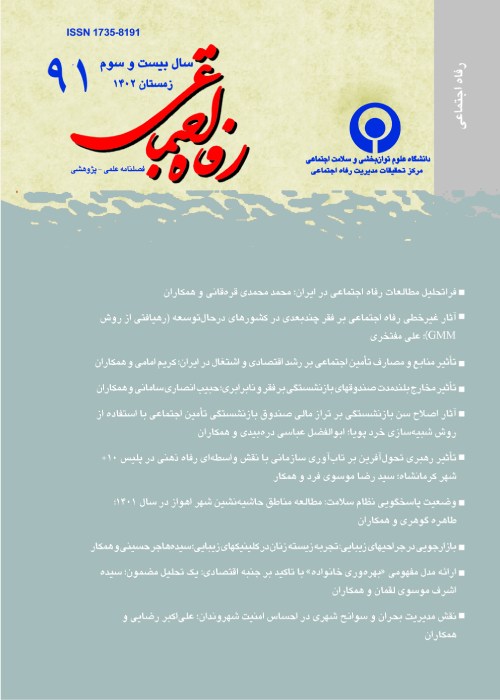The Study of Oil Rent Effects on Inequality of Happiness in Selected Oil Exporting Countries
Achieving higher levels of happiness is one of the major goals of economists in both developed and developing countries. In addition to achieving higher levels of happiness, reducing the inequality of happiness is also important. Reducing inequalities including inequality of happiness, is one of the important goals of economic policy makers in today’s world. Happiness and inequality of happiness are equal to income and inequality of income, and since the income inequality has great importance in economics, in recent years, the happiness inequality has also attracted the attention of researchers and policymakers. The happiness inequality is much more important than level of happiness because the income inequality is much more important than income. happiness Inequality is the difference of happiness between different deciles in a society. In the happiness inequality studies, the link between oil revenues and happiness inequality in oil-exporting countries is a major issue that has been little addressed. In other words, the effect of oil revenues on the happiness inequality from the perspective of the resource curse hypothesis can be a new and interesting topic in completing the theory of resource curse hypothesis. Therefore, this study first examines the relationship between oil rent and happiness inequality in selected oil exporting countries.
The purpose of this paper is to investigate how the rent of oil revenues affect happiness inequality as well as testing the hypothesis of resource curse and the threshold effect of oil rent on the happiness inequality in the OPEC countries during the period of 2005-2012. For this purpose, using theoretical literature and applying the threshold panel method, the factors influencing happiness inequality have been modeled. Since the hypothesis of this research is to test the effects of nonlinear oil rents on the happiness inequality, therefore, based on the hypothesis of this research, the experimental model will be specified as a threshold model which the threshold variable is the ratio of oil rents to gross domestic product. The threshold value is obtained by the Hansen’s (1999) method based on the estimation of the model for different values of the threshold variable, and minimizing the total squared error. In other words, the amount of the threshold variable, which involves the minimum sum of the squared error, is the selected threshold value which should be tested by the Hansen’s bootstrapping method to decide the significance or insignificance of the threshold value.
The results of model estimation have shown that the effect of oil rents on happiness inequality is nonlinear which means before the threshold of 17.7% of the ratio of oil rents to GDP, this variable has a significant negative effect on happiness inequality, but after crossing this threshold, the ratio of oil rents to GDP has not had a significant effect on the happiness inequality in the OPEC countries.Unemployment has had a significant positive impact on the happiness inequality in the OPEC countries. In other words, by increasing unemployment in societies and the loss of income and job opportunities for part of the community, the splitting of happiness between different income groups or happiness inequality will be increased.Inflation has also had a significant positive impact on the happiness inequality in these countries. Inflation will reduce the real income of low-income and middle-income earners, mainly workers and other fixed-income groups. In contrast, it increases the value of wealth and assets for the rich, so it is expanding the internal gap between low-income groups and high-income groups, so the happiness inequality will be increased.The rule of law index has a significant negative impact on happiness inequality. If laws are implemented in the same way for all people in the community and there is no difference among social classes in the issuance of judiciary, the sensitivity of the satisfaction of the implementation of justice in society is created. Then this sense of justice will increase the level of satisfaction and happiness of the poor classes and can reduce the gap of happiness between the different deciles.Corruption has had a significant positive impact on happiness inequality. Corruption means the abuse of power by government officials to earn personal profits. In fact, corruption can be recognized as a privilege and instrumentality in the hands of a group of people who can easily access various privileges which is obtained through the different types of rent. As a result of the lack of equitable distribution of resources and rents, the division of the class will deepen and increase the happiness inequality in society. The social capital index has had a negative but insignificant impact on happiness inequality. The social capital, through increasing the components of trust, participation and cooperation, can lead to a reduction in class distance and the promotion of happiness levels and the reduction of happiness inequality, but the meaninglessness of this effect could be arisen by the time constraints of the data.
Based on the results of this study, it is suggested that policy makers in the OPEC countries should reduce the happiness inequality and create opportunities for happiness for all segments of the society by expending oil revenues. Also, by institutional reforms, monetary and financial discipline of governments can reduce the happiness inequality as a result of reducing unemployment and inflation. Justice in enforcing laws, reducing corruption and improving social capital is also very effective in reducing the happiness inequality.Ethical ConsiderationsAuthors’ contributionsAll authors contributed in producing of the research.FundingIn the present study, all expenses were borne by the author and he did not have any sponsors.Conflicts of interestThe authors declared no conflict of interest.AcknowledgmentsIn this article, all rights relating to references are cited and resources are carefully listed.
- حق عضویت دریافتی صرف حمایت از نشریات عضو و نگهداری، تکمیل و توسعه مگیران میشود.
- پرداخت حق اشتراک و دانلود مقالات اجازه بازنشر آن در سایر رسانههای چاپی و دیجیتال را به کاربر نمیدهد.




